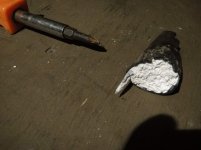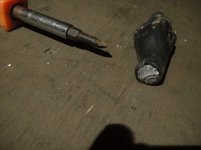jdw96flstc
New member
I am in need of some advice. I know nothing about electrical things. Here is my application.
I am going to drop off of an electrical service pole that the local electrical company is going to provide. I am running an additional 400'-0" of underground to my cabin site. The burning question is as follows.
What size wire do I need?
I have been told that 4 wire mobile home direct bury wire will be ok. I am going to have central heat and air, electric stove, washer, and dryer in the new cabin. Any help would be great.
Thanks,
JDW
I am going to drop off of an electrical service pole that the local electrical company is going to provide. I am running an additional 400'-0" of underground to my cabin site. The burning question is as follows.
What size wire do I need?
I have been told that 4 wire mobile home direct bury wire will be ok. I am going to have central heat and air, electric stove, washer, and dryer in the new cabin. Any help would be great.
Thanks,
JDW

